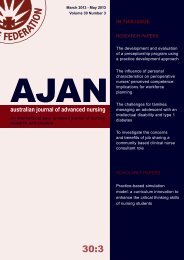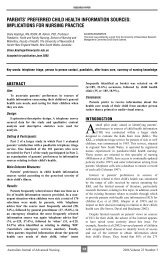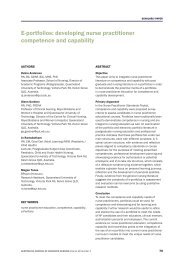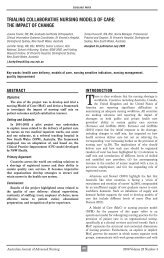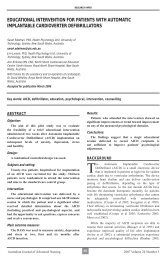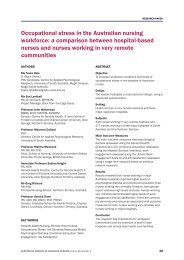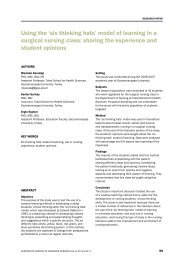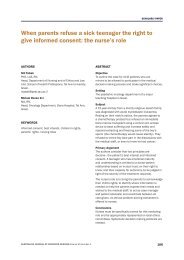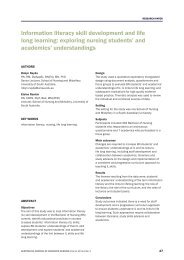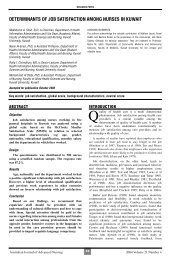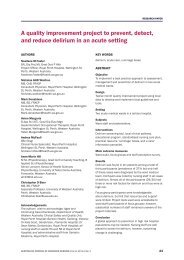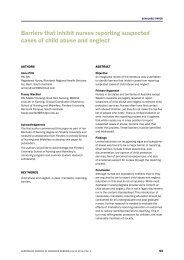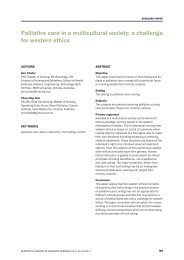australian journal of advanced nursing
australian journal of advanced nursing
australian journal of advanced nursing
You also want an ePaper? Increase the reach of your titles
YUMPU automatically turns print PDFs into web optimized ePapers that Google loves.
SCHOLARLY PAPER<br />
Nurse practitioners in drug and alcohol: where are<br />
they?<br />
AUTHOR<br />
Stephen Ling<br />
RN, NP, MRCNA<br />
Drug and Alcohol Nurse Practitioner, Hunter New<br />
England Area Health Service. Conjoint Teacher, School<br />
<strong>of</strong> Nursing and Midwifery, Faculty <strong>of</strong> Health University<br />
<strong>of</strong> Newcastle, New South Wales, Australia<br />
Stephen.ling@hnehealth.nsw.gov.au<br />
Acknowledgement<br />
A version <strong>of</strong> this paper was presented to the 2007<br />
Drug and Alcohol Nurses <strong>of</strong> Australasia annual<br />
conference 2007 with support from the Alcohol<br />
Education and Rehabilitation Foundation, Grant Ref<br />
No: P2‑230/D1883.<br />
KEY WORDS<br />
nurses, nurse practitioner, drug and alcohol,<br />
treatment, nurse prescribing<br />
ADDENDUM<br />
Since the acceptance <strong>of</strong> this article the Australian<br />
Federal Government has announced funding <strong>of</strong><br />
$59.7 million over the next four years to expand the<br />
role <strong>of</strong> Nurse Practitioners throughout Australia. This<br />
funding includes support to allow access for Nurse<br />
Practitioners to the Medicare Benefits Schedule and to<br />
the Pharmaceutical Benefits Scheme (PBS) from 2010<br />
(Australian Government 2009). Whilst this is welcome<br />
news for Australian Nurse Practitioners the details <strong>of</strong><br />
the funding have not yet been released. It remains<br />
to be seen as to whether the budget announcement<br />
will provide Medicare and PBS access to all Nurse<br />
Practitioners or to a restricted few. It is also as yet<br />
unknown as to whether this level <strong>of</strong> funding will be<br />
sufficient, particularly with the role <strong>of</strong> the Nurse<br />
Practitioner being one still in development.<br />
ABSTRACT<br />
Objective<br />
The role <strong>of</strong> nurse practitioner encompasses <strong>advanced</strong><br />
levels <strong>of</strong> practice with the potential to prescribe a<br />
range <strong>of</strong> medications within a recognised area <strong>of</strong><br />
practice along with the use <strong>of</strong> appropriate ordering<br />
<strong>of</strong> pathology tests and referral practices. This paper<br />
introduces the nurse practitioner in drug and alcohol.<br />
Setting<br />
The nurse practitioner in Drug and Alcohol has the<br />
potential to support and enhance existing medical<br />
models <strong>of</strong> patient care in a variety <strong>of</strong> settings.<br />
Primary Argument<br />
Employment <strong>of</strong> nurse practitioners may be a way <strong>of</strong><br />
addressing workforce issues. The <strong>advanced</strong> level <strong>of</strong><br />
practice and resultant responsibility also requires<br />
higher levels <strong>of</strong> remuneration, which need to be<br />
accepted within an <strong>advanced</strong> practice framework.<br />
In many cases this model <strong>of</strong> care may in fact be<br />
acknowledging existing practices in areas where<br />
<strong>nursing</strong> staff are forced to undertake more <strong>advanced</strong><br />
roles due to the shortage <strong>of</strong> appropriately trained<br />
Medical staff. Collaborative care involving nurse<br />
practitioners can lead to increased access, reduced<br />
waiting times and longer consultation times.<br />
Conclusion<br />
Nurse practitioners in the alcohol and other drugs<br />
field have enormous potential to support other experts<br />
in collaborative care for patients with substance use<br />
disorders. This potential does not come without some<br />
additional financial costs but the potential benefits to a<br />
health service in employing a nurse practitioner skilled<br />
in the management <strong>of</strong> substance use disorders can<br />
be enormous. The full potential <strong>of</strong> nurse practitioners<br />
in drug and alcohol will not however be realised until<br />
financial arrangements for outpatient care become a<br />
reality.<br />
AUSTRALIAN JOURNAL OF ADVANCED NURSING Volume 26 Number 4 64



